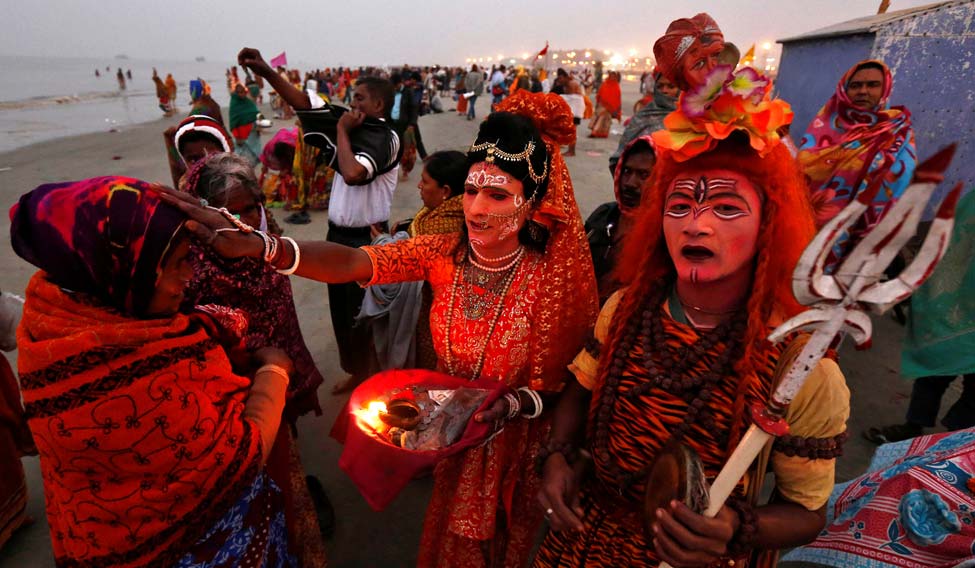Makar Sankranti is one of the many names given to the winter harvest festival of India. Sankranti is the Sanskrit word for the Sun's movement from one constellation of the zodiac to the next. The festival holds a celestial significance as, according to Indian astronomy, on this day the Sun leaves the zodiacal sign of Dhanu (Sagittarius) and enters Makara (Capricorn), marking the first change in the zodiac after the winter solstice. Thus the name, Makar Sankranti, literally means 'the movement of the Sun into Capricorn'.
Though celebrated mostly by Hindus, the festival announces the beginning of the harvest season and the arrival of spring. As the nation celebrates Makar Sankranti with much fervour and gaiety, let's look at some interesting facts about the festival:
A Hindu festival that follows solar calendar
Although most Hindus festivals are celebrated according to the lunar calendar (Panchang), Makar Sankranti—being a solar event—is an exception. In fact, it is the first solar festival after winter solstice and is celebrated on the same date, every year.
Many names, many forms
While most of India celebrates the event as Makar Sankranti, some regions call it by different names. As the Sun's entry to Capricorn also means the beginning of its six-month journey in the northern hemisphere, known as Uttarayan—the name of the festival in Gujarat. The event coincides with the end of the Hindu month of Pousha and the beginning of Magha. While Bengal considers the end of Pousha auspicious and calls it Pousha Sankranti, Haryana, Himachal Pradesh and Punjab focus on the beginning of the new month and celebrate it as Maghi. Lohri, which is celebrated a day before Makar Sankranti, represents the longest night of winters. In Assam, it is celebrated as Magh Bihu, while in Tamil Nadu, it is a four-day festival called Thai Pongal—named so because it is also the first day of the tenth (thai) month of the Tamil calendar. In Uttar Pradesh and Bihar, Makar Sankranti is known as Khichdi Parv or Til Sankranti. To mark the occasion, people make a special dish, khichdi, and offer it to the Sun god.
Intertwined in Hindu mythology
Besides celestial significance, Makar Sankranti plays a major role in Hindu mythology as well. In Mahabharata, as Bhishma Pithama lay on the bed of arrows, he waited for the Sun to start its northward journey called Uttarayana, before surrendering to death as it is believed that attaining death during this period liberates the soul. According to another story, on this day, the river goddess Ganges, on the request of sage Bhagirath Muni, left her abode in heaven and flowed down on Earth to meet the ocean. While Hindus believe that bathing in the sacred river can relieve them of their sins, Makar Sankranti is considered to be the most pious time to take the holy dip. Perhaps that explains why, in Uttar Pradesh, Kumbh Mela, world's largest congregation of Hindus gathered to bathe in the holy river, starts on this day. In West Bengal, on this day every year, pilgrims gather at the Gangasagar fair at Sagardwip, an island in the Sundarbans, to bathe in the Ganges. In Kerala, the austere pilgrimage of Shabrimala concludes on Makara Sankranti with an annual festival, Makaravilakku, held at the hill shrine. Marking the occasion, pilgrims worship 'makara jyothi', literally translated to 'the light of Capricorn'.
The day of high-flying kites
After long, cold nights, Makar Sankranti marks the beginning of sun-filled, warm days, giving a reason for people to step out in the open and bask in sun. The tradition of kite flying lets people come out in large numbers and celebrate sunshine while getting rid of the damp, winter chills and bacteria that thrive in the cold. While the kite flying frenzy envelops most of the country on Makar Sankranti, Gujarat hosts the annual International Kite Festival where kite makers and flyers from all over the world showcase their unique creations and kite flying skills.
MAKAR SANKRANTI
A harvest festival with religious significance
 Men dressed as Hindu Lord Shiva (R) and Goddess Parvati (C) give blessings to a pilgrim at the confluence of the river Ganges and the Bay of Bengal, ahead of the "Makar Sankranti" festival at Sagar island, south of Kolkata | REUTERS
Men dressed as Hindu Lord Shiva (R) and Goddess Parvati (C) give blessings to a pilgrim at the confluence of the river Ganges and the Bay of Bengal, ahead of the "Makar Sankranti" festival at Sagar island, south of Kolkata | REUTERS
This browser settings will not support to add bookmarks programmatically. Please press Ctrl+D or change settings to bookmark this page.
THE WEEK
Select your subscription
Please select subscription.
Select payment method
Please select payment method.
Confirm your subscription
Recharge E-Wallet
Enter recharge amount:
Topics :
#religion






